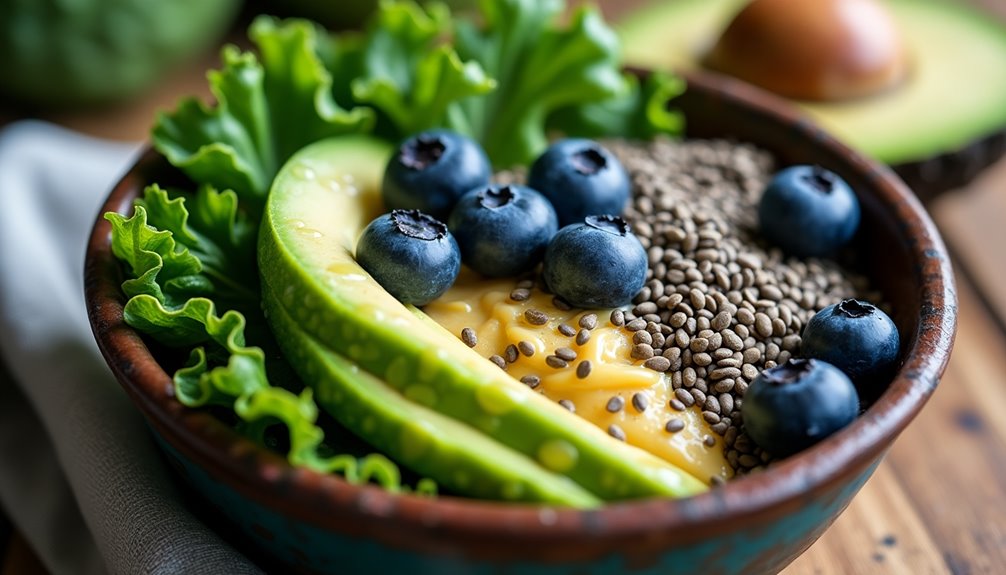Fiber plays an essential role in your digestive health. It helps maintain regular bowel movements, enhancing nutrient absorption and preventing issues like constipation and bloating. You need about 25 grams of fiber daily if you're a woman and 38 grams if you're a man, sourced from whole grains, fruits, and vegetables. There are two main types: soluble fiber, which can lower cholesterol, and insoluble fiber, which adds bulk to stool. A high-fiber diet not only supports your gut microbiota but also aids in weight management and blood sugar control. There's much more to explore about how fiber can transform your health.
Key Takeaways
- Fiber promotes digestive health by preventing constipation and regulating bowel movements, enhancing overall gut function.
- Soluble fiber helps lower cholesterol levels, while insoluble fiber adds bulk to stool, benefiting digestive processes.
- A high-fiber diet improves nutrient absorption and supports the growth of beneficial gut bacteria.
- Fiber aids in weight management by promoting satiety and controlling blood sugar levels, enhancing insulin sensitivity.
- Recommended daily intake is 25 grams for women and 38 grams for men, emphasizing the importance of variety in fiber sources.
Importance of Fiber
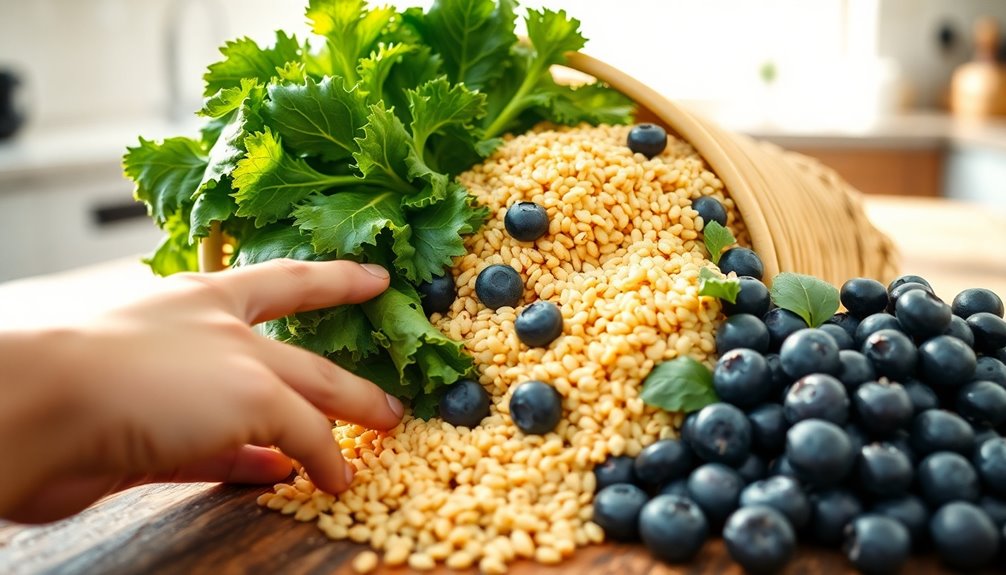
Fiber plays a crucial role in maintaining digestive health, acting as a natural regulator for your digestive system. By incorporating sufficient fiber into your diet, you not only enhance your digestive efficiency but also support overall well-being.
One of the key benefits of fiber is its ability to promote satiety. When you consume fiber-rich foods, they expand in your stomach, which helps you feel fuller for longer. This can aid in weight management, as you're less likely to reach for unhealthy snacks.
Moreover, fiber positively influences your gut microbiota—the diverse community of bacteria living in your intestines. A healthy gut microbiota is essential for efficient digestion and nutrient absorption. Fiber acts as a prebiotic, providing nourishment for these beneficial bacteria. When they thrive, they produce short-chain fatty acids that contribute to gut health and may reduce inflammation.
Incorporating different types of fiber into your meals can create a thriving environment for your gut microbiota. This fosters a balanced digestive system, which can help prevent issues like constipation and bloating. Additionally, a plant-based diet, rich in fiber-rich foods, is associated with numerous health benefits, including improved heart health and reduced disease risk.
Your body deserves the finest, and prioritizing fiber is a significant step toward achieving that.
Types of Dietary Fiber
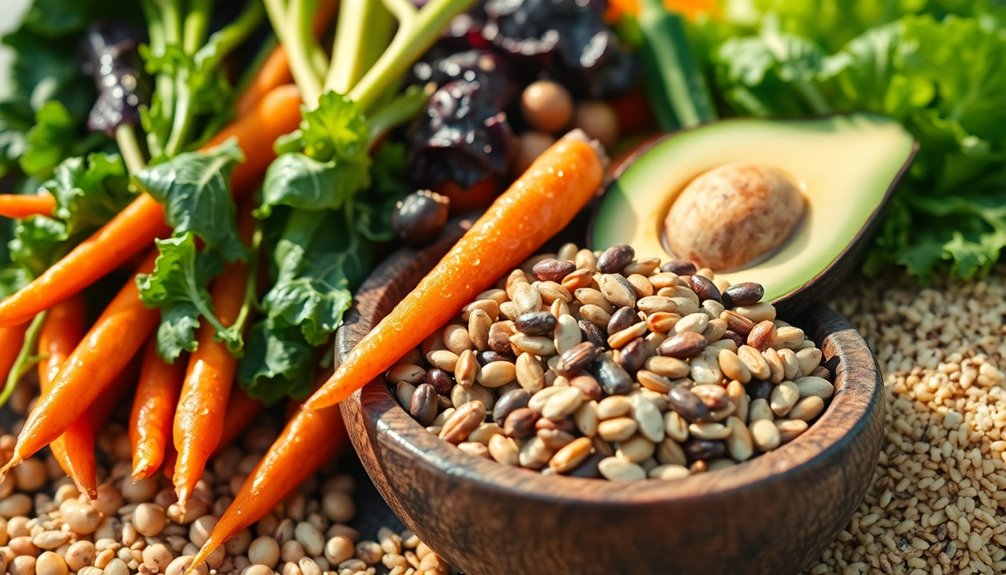
What types of dietary fiber should you be aware of when planning your meals? Understanding the difference between soluble and insoluble fiber is vital for your digestive health. Soluble fiber dissolves in water, forming a gel-like substance that can help lower cholesterol levels and control blood sugar. Common fiber sources include oats, beans, lentils, and certain fruits like apples and citrus. Incorporating these foods into your diet can provide you with necessary nutrients while supporting your overall well-being.
On the other hand, insoluble fiber doesn't dissolve in water and adds bulk to your stool, promoting regular bowel movements. This type of fiber is found in whole grains, nuts, seeds, and vegetables like carrots and broccoli. Including a variety of these fiber sources in your meals can help maintain a healthy digestive system.
If you find it challenging to get enough fiber from your diet, fiber supplements can be a convenient option. These supplements come in various forms, such as powders, capsules, or chewable tablets. However, it's vital to choose high-quality products and consult a healthcare professional before adding them to your routine. Additionally, embracing a natural cycle of consumption can help you achieve a more balanced diet that supports your digestive health and overall well-being, similar to age-old health practices.
How Fiber Supports Digestion

Including sufficient fiber in your diet plays an important role in supporting digestion. When you consume fiber, especially soluble fiber, it undergoes a process known as fiber fermentation in your gut. This fermentation occurs as beneficial gut bacteria break down fiber, producing short-chain fatty acids that can strengthen your intestinal health and provide energy to your cells.
Moreover, fiber helps regulate the movement of food through your digestive tract. It adds bulk to your stool, making it easier for your body to eliminate waste. This process not only prevents constipation but also promotes a more efficient digestive system overall.
As you incorporate more fiber into your meals, you may notice improved regularity and less discomfort.
Additionally, fiber interacts with digestive enzymes in a way that enhances nutrient absorption. When you eat fiber-rich foods, these enzymes work more effectively, breaking down nutrients so your body can absorb them better. This synergy between fiber and digestive enzymes is optimal for maximizing the nutritional benefits of your meals.
To support your digestion, aim for a variety of fiber sources, such as fruits, vegetables, whole grains, and legumes. Furthermore, incorporating smoothie recipes into your diet can be an excellent way to increase your fiber intake while enjoying delicious meals. By doing so, you'll not only nourish your body but also cultivate a thriving digestive environment. Embracing fiber in your diet is a simple yet powerful step toward achieving best digestive health and feeling your best.
Benefits for Gut Health
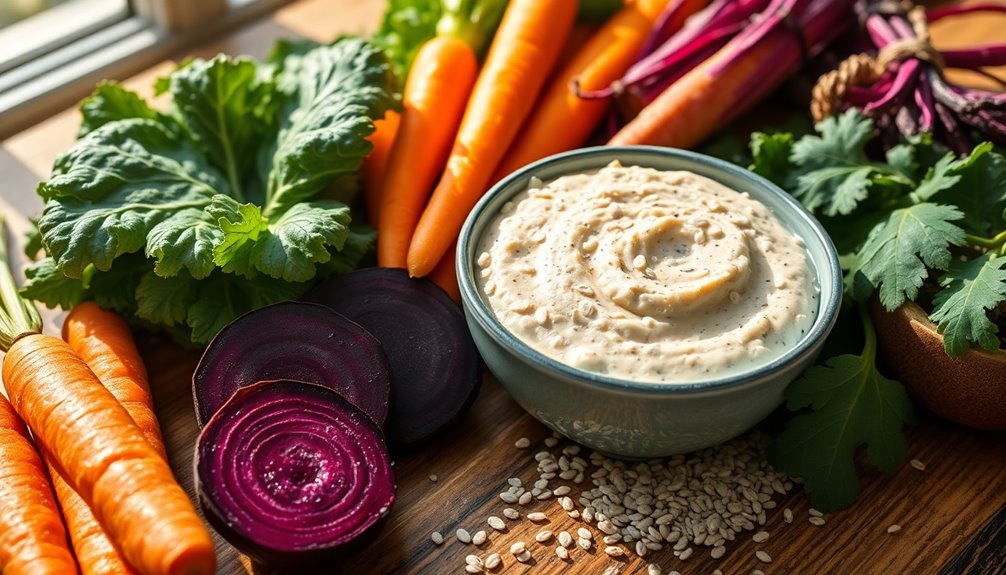
While many people focus on fiber's role in digestion, its benefits extend greatly to gut health as well. When you consume adequate fiber, you're not just aiding digestion; you're also supporting the complex ecosystem of gut microbiota. These microorganisms play an essential role in your overall health, influencing everything from nutrient absorption to immune function. A diverse and balanced gut microbiota can enhance your body's ability to fend off harmful pathogens and may even lower the risk of chronic diseases.
Research shows that a high-fiber diet can positively affect gut microbiota composition. When you consume soluble fiber, it ferments in the colon, producing short-chain fatty acids (SCFAs) that nourish the cells lining your gut and help regulate inflammation. This is particularly important for individuals managing inflammatory bowel diseases (IBD), such as Crohn's disease and ulcerative colitis. By incorporating more fiber into your diet, you may help reduce the severity of symptoms associated with these conditions.
Moreover, fiber-rich foods, like fruits, vegetables, legumes, and whole grains, can promote the growth of beneficial bacteria while suppressing harmful ones. This balance is crucial for maintaining gut health and preventing issues like bloating, gas, and irregular bowel movements. Additionally, a balanced diet that includes low-carb, anti-inflammatory foods may further support your gut health and overall well-being.
In short, prioritizing fiber in your diet not only aids digestion but also fosters a healthier gut microbiota, which is indispensable for overall well-being. So, embrace fiber-rich foods and take a proactive step toward better gut health.
Fiber and Weight Management
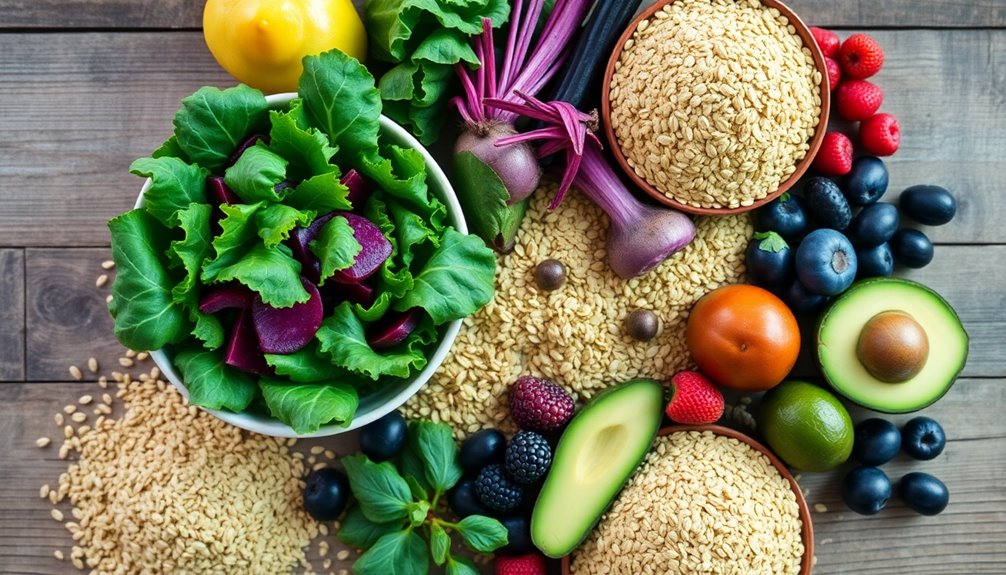
In the quest for effective weight management, fiber proves to be an invaluable ally. Incorporating fiber into your diet can notably impact your weight loss efforts, primarily through its effects on satiety and metabolism. When you consume fiber-rich foods, they tend to fill you up faster and keep you feeling full longer. This means you're less likely to overeat, making it easier to stick to your dietary goals.
Here are some key benefits of fiber for weight management:
- Promotes satiety: High-fiber foods slow digestion and increase feelings of fullness.
- Supports healthy metabolism: Fiber can positively influence metabolic processes, helping your body utilize energy effectively.
- Reduces calorie intake: When you feel full, you're less likely to reach for unhealthy snacks, leading to lower overall calorie consumption.
- Encourages healthy eating patterns: Fiber-rich meals often include fruits, vegetables, and whole grains, which are nutrient-dense and beneficial for overall health. Additionally, incorporating plant-based protein sources into your meals can further enhance satiety and assist in weight management.
Fiber's Role in Blood Sugar Control

Fiber not only aids in weight management but also plays a significant role in blood sugar control. When you integrate more fiber into your diet, you're actively supporting your body in managing glucose levels, which is critical for overall health, especially for those focused on diabetes management.
Soluble fiber, in particular, forms a gel-like substance in your gut, slowing down the absorption of sugar. This means your blood sugar levels rise more gradually, reducing spikes that can lead to health complications.
Research shows that a high-fiber diet can enhance insulin sensitivity, allowing your body to use insulin more effectively. Improved insulin sensitivity is essential for preventing insulin resistance, a common issue for many individuals with diabetes.
When you consume foods rich in fiber, like fruits, vegetables, and whole grains, you're not just filling your plate; you're also creating a supportive environment for stable blood sugar levels.
By choosing fiber-rich foods, you're helping your body regulate its glucose levels more effectively. This is particularly important if you're looking to cultivate a sense of community and belonging within a health-conscious group.
Sharing meals that focus on fiber can foster connections and inspire others to contemplate their dietary choices.
Recommended Daily Fiber Intake
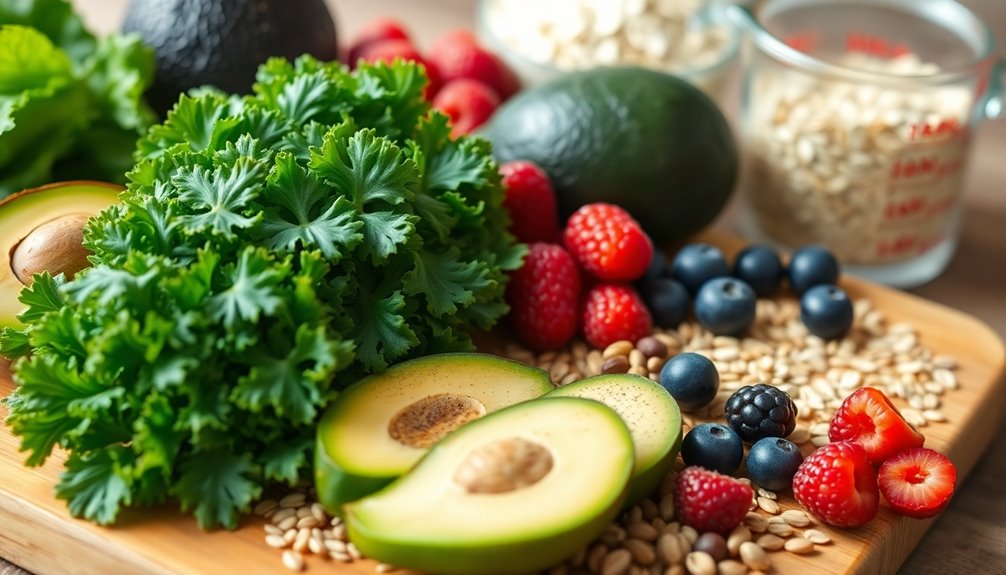
To achieve peak digestive health, meeting the recommended daily fiber intake is essential. The general guideline suggests that adults should aim for about 25 grams of fiber per day for women and 38 grams for men. However, most people fall short of these targets. Ensuring you get enough fiber not only aids digestion but also supports overall wellness.
Here are some key points to keep in mind:
- Variety Matters: Incorporate a mix of soluble and insoluble fiber for balanced benefits.
- High Fiber Foods: Foods like whole grains, legumes, fruits, and vegetables are excellent sources.
- Fiber Supplements: If you're struggling to meet your fiber needs through food alone, fiber supplements can be a helpful addition.
- Start Gradually: If you're not used to high fiber foods, increase your intake slowly to avoid discomfort.
Getting the right amount of fiber can transform your digestive experience. High fiber foods, such as lentils, oats, and berries, not only keep you feeling full but also promote regular bowel movements. On the other hand, fiber supplements can be a practical solution for those with busy lifestyles or specific dietary restrictions.
Tips for Increasing Fiber Intake
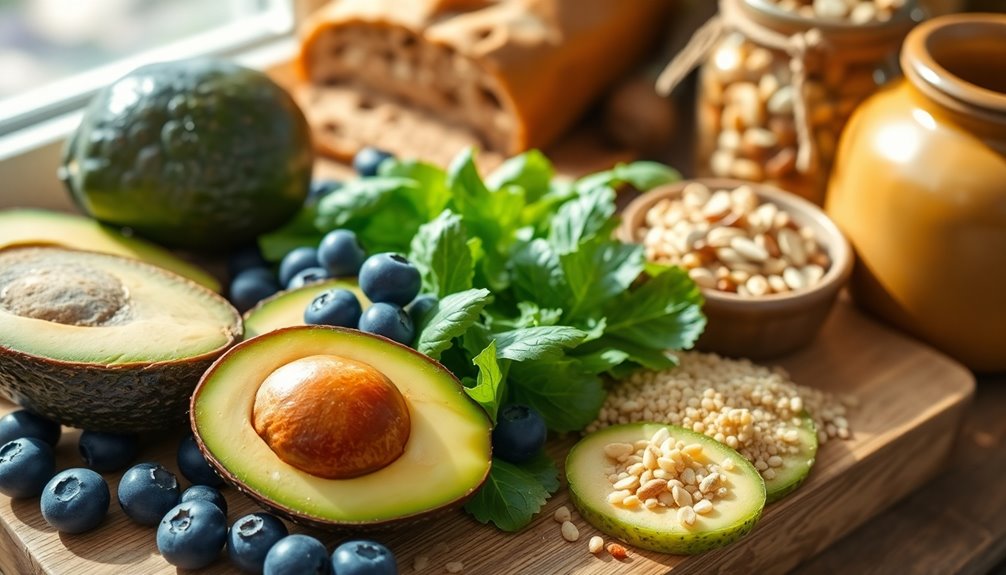
Boosting your fiber intake can be easier than you think. Start by incorporating fiber-rich snacks into your daily routine. Instead of reaching for chips or cookies, opt for fruits, vegetables, or whole grains. Snack on baby carrots, apple slices, or a handful of almonds to satisfy your cravings while enhancing your fiber intake. You might also consider swapping out white bread and pasta for whole grain alternatives, which can notably increase your fiber consumption without sacrificing taste.
Another effective strategy is to add legumes to your meals. Beans, lentils, and chickpeas aren't only versatile but also packed with fiber. Toss them into salads, soups, or stews to boost both texture and nutritional value.
If you find it challenging to meet your fiber goals through food alone, fiber supplements can be a practical option. These come in various forms, such as powders or capsules, and can help fill any gaps in your diet. However, remember to choose a high-quality supplement, and consult with a healthcare professional if you're unsure about which one to use.
Lastly, keep a food journal to track your fiber intake. This can help you stay accountable and identify areas where you can improve. By making small, consistent changes, you'll not only enhance your digestive health but also feel more connected to your well-being. Embrace these tips, and you'll find that increasing your fiber intake may become a rewarding part of your lifestyle.
Frequently Asked Questions
Can Fiber Help With Constipation in Children?
Yes, fiber can definitely help with constipation in children. It promotes regular bowel movements and can alleviate discomfort. Incorporating fiber-rich snacks, like fruits, vegetables, and whole grains, into their diet offers significant pediatric benefits.
You'll find that these snacks not only improve digestion but also provide essential nutrients. Encouraging your child to enjoy these foods can make a positive impact on their overall health and well-being, fostering a sense of belonging in healthy eating habits.
Does Cooking Affect the Fiber Content of Foods?
Imagine fiber as a delicate flower, blooming in your food. Cooking methods can greatly impact fiber preservation.
Steaming and microwaving tend to maintain more fiber compared to boiling, which may rinse away valuable nutrients.
Roasting can also enhance flavor while keeping fiber intact.
To maximize your fiber intake, embrace gentler cooking techniques. By doing so, you'll not only nourish your body but also cultivate a deeper connection with your meals.
Is It Possible to Consume Too Much Fiber?
Yes, it's possible to consume too much fiber, leading to a fiber overdose. While fiber is necessary for health, excessive intake can cause digestive issues like bloating, gas, and cramps. Some individuals may experience fiber intolerance, making them more sensitive to high amounts.
It's pivotal to gradually increase fiber in your diet and stay hydrated to avoid these problems. Listening to your body can help you find a balanced intake that works for you.
How Does Fiber Influence Gut Bacteria Diversity?
Fiber plays an essential role in influencing gut microbiota diversity. When you consume fiber-rich foods, it acts as a prebiotic, feeding beneficial bacteria in your digestive system. This promotes a diverse microbial community, vital for overall health.
A varied gut microbiota can enhance digestion, boost immunity, and reduce inflammation. By incorporating different types of fiber into your diet, you're supporting a thriving environment for these bacteria, fostering balance and well-being in your gut.
Are Fiber Supplements as Effective as Natural Sources?
When considering whether fiber supplements are as effective as natural sources, you'll find that natural fiber sources often provide additional nutrients that supplements lack.
While fiber absorption can be adequate with supplements, whole foods offer a variety of benefits, including vitamins and minerals.
Incorporating diverse fiber sources, like fruits, vegetables, and whole grains, into your diet not only supports gut health but also enhances overall well-being, creating a more balanced approach to nutrition.
Conclusion
Incorporating fiber into your diet is like giving your digestive system a daily workout. Just as a strong exercise routine keeps your body fit, adequate fiber intake promotes digestive health, aids in weight management, and stabilizes blood sugar levels. Studies show that a diet rich in fiber can reduce the risk of chronic diseases. By making small adjustments, like adding beans to your salad or snacking on fruits, you can pave the way for a healthier gut and overall well-being.

